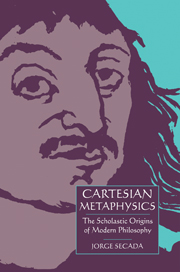Book contents
- Frontmatter
- Contents
- Preface
- Abbreviations
- Prologue
- Part I The unity of Cartesian metaphysics
- Part II Ideas and the road from essence to existence
- 4 Ideas and the world in the mind
- 5 My wax, my intellect and I
- 6 Essentialism and the existence of God
- Part III Cartesian substances
- Epilogue
- Notes
- References
- Index
6 - Essentialism and the existence of God
Published online by Cambridge University Press: 22 September 2009
- Frontmatter
- Contents
- Preface
- Abbreviations
- Prologue
- Part I The unity of Cartesian metaphysics
- Part II Ideas and the road from essence to existence
- 4 Ideas and the world in the mind
- 5 My wax, my intellect and I
- 6 Essentialism and the existence of God
- Part III Cartesian substances
- Epilogue
- Notes
- References
- Index
Summary
Essentialism and Descartes's demonstrations of the existence of God
The study of past philosophy must be guided by the demands of historical accuracy and of philosophical understanding. These aims are not truly separable. Still, attention to the one can lead, each in its own way and with unequally valuable consequences, to disregard for the other. The history of philosophy should blend the two as complements (though not necessarily in equal doses). Indeed, the essentialist interpretation of Descartes's metaphysics strives after both philosophical and historical insight; it attains its goal most successfully regarding the proofs of God's existence.
As Martial Gueroult has put it, ‘all interpretation of Cartesian metaphysics must rest above all on … the Meditations, not because it contains the whole of philosophy … but because it comprises the essential elements set forth according to their true justification’. The Meditations is without doubt the most genuine expression of the content and spirit of Descartes's philosophy. It contains his more important and enduring contributions to the subject, presented so that ‘what is put forward first [is] known without the aid of what comes later; and what follows [is] arranged in such a way that its demonstration depends solely on what has gone before’ (AT, VII, 155). A mere glance at the titles of the six Meditations reveals their central themes: the essence and the existence of the self, of God, and of matter. Overtly inspired by sceptical arguments, Descartes defends reason and uncovers the innate contents of the intellect.
- Type
- Chapter
- Information
- Cartesian MetaphysicsThe Scholastic Origins of Modern Philosophy, pp. 148 - 180Publisher: Cambridge University PressPrint publication year: 2000



